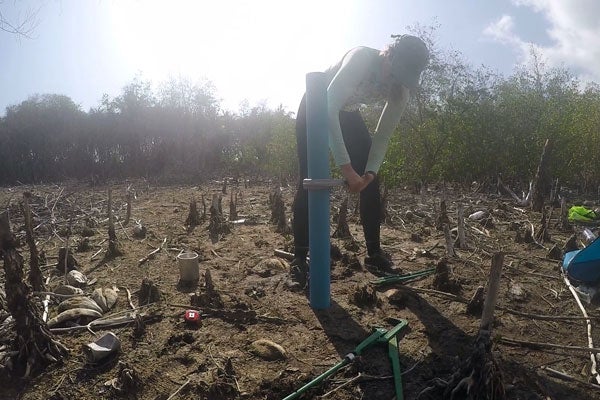Carruthers leads sea level rise research in the Maldives
An East Carolina University researcher is part of a groundbreaking study that continues to explore the impacts of sea level rise and forest mortality.
Dr. Lucy Carruthers, a postdoctoral scholar in the Department of Coastal Studies, led a team of researchers at Northumbria University that found rising sea level and a climate phenomenon known as the Indian Ocean Dipole have led to some Maldivian Islands losing over half of their mangrove cover since 2020.
Carruthers’ research is consistent with what researchers at the Coastal Studies Institute have found in North Carolina with increased sea level rise and other climate driven factors, according to Dr. Reide Corbett, executive director of the Coastal Studies Institute.
“CSI scientists are engaged in research in North Carolina and around the globe,” said Corbett. “This work across these different coastal systems helps inform the collective understanding and connections between climate and coastal change.”
The team combined evidence from sea level, climate data and remote sensing with field observations of sediment geochemistry and dendrology to investigate the mangrove dieback. They warn that the findings have implications not only for the Maldives, but also for coastal ecosystems around the world.
In 2020, more than a quarter of islands containing mangrove forests in the Maldives saw trees experiencing a gradual deterioration before dying, a condition known as dieback.
Satellite imagery of both inhabited and uninhabited islands revealed the severity, showing that some islands lost over half of their mangrove cover. Analysis of mangrove wood showed that dead trees experienced signs of salinity stress compared to living ones, suggesting that the trees were struggling to handle the higher salt levels.

ECU postgraduate scholar Dr. Lucy Carruthers led a study that explored the impacts of sea level rise and forest mortality. (Photo by John McCord)
Mangroves play an essential role in protecting coastal regions by acting as natural barriers against storms, erosion and flooding. As biodiversity hotspots, they are vital nurseries for marine species such as crabs, prawns and fish, making them crucial for food security and livelihoods in many coastal communities. They also provide valuable resources such as construction materials for housing.
The researchers found that sea levels around the Maldives rose at an accelerated rate of over one inch per year between 2017 to 2020. Toward the end of this period, an unusually intense climate phenomenon known as the Indian Ocean Dipole occurred, causing warmer sea surface temperatures and an increase in sea level in the western Indian Ocean.
Although mangroves naturally build up their own sediment, allowing them to adapt to gradually rising seas, this rate of sea level rise was too fast for the mangroves to keep pace, according to the research.

Dr. Lucy Carruthers collects sediment cores as part of her research in the Maldives. (Contributed photo)
As tidal movements are more limited in the basin areas where many mangrove forests grow, the rising sea level meant that seawater effectively flooded the forests. This lack of tidal movement and flooding prevented the mangroves from building the sediment they needed to stay above water. They eventually lost their resilience and died off by drowning, according to the research.
“Sea level in the region reached its highest point on tide gauge records when the dieback occurred in 2020. This coincided with an intense positive phase in the Indian Ocean Dipole, which can induce climate extremes for countries within the Indian Ocean,” said Carruthers.
The research by Carruthers and her team supports research conducted by ECU assistant professor Dr. David Lagomasino that focused on the effects of Hurricane Irma and the damage it caused to Florida’s mangrove forests. Lagomasino and his team found lower-elevated inland forests were hit hardest, as high storm surge levels pushed seawater into the forests with no way to drain, causing widespread dieback.
Carruthers is one of four post-doctoral scholars at the Coastal Studies Institute. According to Corbett, having Carruthers and other post-doctoral scholars is critical to the research and academic programs being conducted at the Coastal Studies Institute.
“Post-doctoral scholars, in partnership with their faculty mentors, are leading cutting edge research and mentoring graduate and undergraduate students,” said Corbett. “Importantly, this great group adds to the diversity of backgrounds and experience across our faculty. The two-way exchange of information and experience between faculty and post-docs is a critical part of the success of our post-doc program.”
Although the Maldives and the Outer Banks are on the other side of the world from each other, they face similar issues.
“The challenges facing the Maldives due to climate change — like sea water rise, shoreline erosion, saltwater intrusion of groundwater supplies, and ecosystem loss — mirror those impacts on the Outer Banks,” said Carruthers. “Being here allows me to engage in research that directly supports island communities confronting these urgent environmental and climatic issues.”